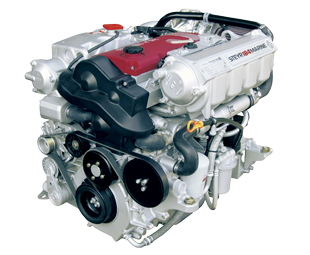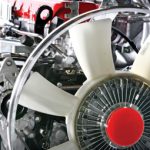The non-stick trolleybus

Back in the days when trolleybuses were a familiar sight in South African cities, everyone dreaded the words “power failure”. Any interruption in the supply of electricity would bring the whole network to a standstill.
Whenever a power failure occurred during the trolley-bus era, some of the three-axled behemoths inevitably ended up at rest in the most inconvenient places: like across entrances or busy intersections. In South Africa and other countries within the traditionally British sphere of influence, they have long since disappeared. Elsewhere in the world, however, trolley buses continue to form part of modern transport networks and have evolved accordingly. Most recently, German company ESW GmbH developed an auxiliary power unit that can spring into action when the normal flow of electrical current to a bus’s overhead power supply is interrupted.
This gen-set package consists primarily of a Steyr Monoblock engine and a permanent magnet generator. With no separate cylinder block or head, the engine brings to mind memories of Leyland’s fixed-head series power units of the 1960s and ‘70s.
The Steyr Monoblock was originally developed for use in military hybrid-drive-line systems, and is made from a single casting of high-tensile alloy with a uniform cooling jacket and Stellite valve seats. The engine operates at an output speed range of between 1 900 and 3 550 r/min, using unit injectors operating at 2 000 bar fuel pressure. It is Euro 5-compliant – running on diesel, kerosene or maritime diesel fuel – and has a limp-home facility should the electronic management system fail. The flywheel-driven, no-maintenance permanent magnet generator delivers 300 900 V DC of standby power directly to the vehicle’s electrical traction system, and both engine and generator are water-cooled.
BUS NEWS ROUND-UP
How roadworthy are Britain’s buses and coaches?
The number of buses and coaches with first-time passes at mandatory annual roadworthiness tests in Britain is at a 12-year high. “But this has more to do with recent changes in headlamp-aim test rules than with any dramatic improvement in maintenance standards,” says David Wilcox, editor at Commercial Vehicle Engineer. More disturbing is the news that the proportion of bus and coach maintenance arrangements branded “unsatisfactory” in assessments carried out by Vosa, the Vehicle and Operator Services Agency, has been rising steadily for four years and now stands at 54%. “There certainly is no room for complacency among bus and coach fleet engineers,” says Wilcox.
New Nemo, Berlingo, Dispatch and Relay Enterprise vans
Citroën has just launched a seven-strong “Enterprise” range of Nemo, Berlingo, Dispatch and Relay panel vans. These are based on the best-selling versions in their respective ranges. The Enterprise vans have “amongst the highest levels” of standard kit available “on any van in the UK.” All have air conditioning, Bluetooth and reverse parking sensors. Berlingo and Dispatch Enterprise models have USB ports for iPods and Dispatch Enterprise models also include full steel bulkheads, front fog lights and electrically adjustable heated and folding twin-lens door mirrors. The Relay Enterprise vans have full steel bulkheads. Trafficmaster Smartnav satellite navigation with Trackstar stolen vehicle tracking is standard on Berlingo, Dispatch and Relay Enterprise models.
Big bus registrations continue to dive; coaches drop again
January bus and coach registration data from the Society of Motor Manufacturers and Traders (SMMT) in the UK shows that big buses fell 32% in January 2010 versus last January. The drop in big coach registrations is stabilising, but overall the outlook for bus and coach registrations in 2010 is bleak. “January registrations for big buses were nearly 50% below the levels seen in the same period in 2009,” says Paul Everitt, SMMT chief executive. “Whilst the economy has technically escaped the recession, this has not yet lifted demand in the bus sector and the immediate outlook remains very difficult. Coach registrations have now stabilised, but at a much reduced level. It is extremely important that government uses the next Budget to encourage new investment in capital goods and help re-build business confidence.”
Published by
Focus on Transport
focusmagsa



